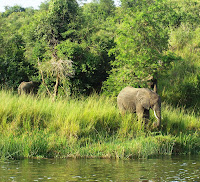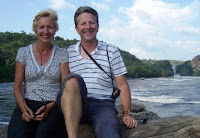No update to the blog for a few weeks as we have been at VSO training for new volunteers in Kampala and access to internet has been limited to checking our emails with not time to do anything more. It was good to see and sample the bright lights of a capital city, although we felt like the country mouse visiting the town mouse! At one point we went to an Italian delicatessen and Sabrina lost Geoff, only to find him staring open-mouthed at a cold counter full of prime steaks.
The training was held at the Lweza (pronounced Louisa) conference centre, which is owned by the Church of Uganda. The accommodation was basic hostel-like, but the hot showers were bliss. Our stay coincided with a retreat for all the bishops of Uganda, so we were sharing the place with 33 bishops. We chatted to them in the meal queues, spoke to the Archbishop of Uganda and met the new bishop of our new cathedral in Kamwenge. But enough name dropping. The best sight was of 35 purple shirts hanging out to dry on the washing line – definitely a missed photo opportunity.
The new volunteers were a mixed but amazing bunch of people. 2 Americans, 1 Kenyan, 1 German, 8 English, 2 couples, and a family with 3 children under 8. Most were in their 20’s and 30’s and we were the oldest, but we felt young. The job skills ranged from doctors and nurses, through fundraisers and sign language teachers to managers and organizational capacity builders (a common job in development circles but we’re still not sure what it really means).
We went up from Fort Portal by bus, which was our first experience of coach travel in Uganda. We sat in the two window seats of three and were joined by a succession of passengers who squeezed into the small third seat. One of them fell asleep on Geoff’s shoulder. The journey took four hours, with stops only to pick up and drop off passengers. There was a chicken under the opposite seat and at every stop, street vendors would try to sell a range of snacks through the windows – goat kebabs, fried bananas, boiled cassava, sugar cane and drinks. We had brought our own sandwiches.
At Kampala we were just dumped off in the street, as apparently the bus company is in dispute with the bus station about an increase in fees of 10,000 USH (about £3.30) per coach. The number of people around was absolutely amazing and special hire drivers (our taxi drivers) were continually thrusting their keys in our faces to tout for business. Fortunately one of my work colleagues, Salvatore, sorted us out with a good, safe and cheap special, although not before a language misunderstanding meant we had walked for 20 minutes through the hot and bustling streets to another bus station.
Back to work this week and we have 4 days of workshops. On Tuesday Geoff was with the senior education officials and local politicians of the district to review last year’s, and plan next year’s, work. On Wednesday and Thursday we facilitated a workshop on HIV/Aids issues in schools with headteachers – 40 of them. On Friday we are told headteachers and host families how to look after the 8 Irish teachers who will be visiting for 5 weeks. Ugandans get quite worried about hosting bazungu (whites) especially with our ‘weak’ stomachs and so we will try to allay their fears.
P.S. We watched Wimbledon on the TV in the next door hotel, eating Minstrels which had been sent by our daughter, Catherine, to our new Post Office Box – the address is
Slide
PO Box 1511
Kamwenge
Uganda
just in case you’re interested. They took 3 weeks to arrive and tasted even better for the wait. The packet of chocolate buttons has however melted into one big button due to the heat. Going back to the tennis, it was great to see the shots of the London skyline between games.
P.P.S. Some more chocolates and liquorice allsorts arrived from Nicola this week as a late Father’s Day present. No pressure Tom
P.P.P.S watched Murray lose last night – very sad. The game finished at 9.00 local time, which meant that the locals were unable to watch their very popular soap opera – equivalent to East Enders. Very culturally insensitive but how often do we get the chance to see a Brit in the semis of Wimbledon?
 Presenting the Perkins machine, a braille typewriter, to Julius, Chief Inspector of Schools and Kellon, the deputy headteacher of Kamwenge Primary School, where the unit is situated.
Presenting the Perkins machine, a braille typewriter, to Julius, Chief Inspector of Schools and Kellon, the deputy headteacher of Kamwenge Primary School, where the unit is situated.  The local flea pit - well actually a mobile phone shop now, reflecting a major Ugandan interest.
The local flea pit - well actually a mobile phone shop now, reflecting a major Ugandan interest. Impressive hoe technique - all that time on the allotment obviously not wasted. Although there is a red cross volunteer very close behind just in case . . .
Impressive hoe technique - all that time on the allotment obviously not wasted. Although there is a red cross volunteer very close behind just in case . . . Dance techniques not as good as hoe techniques.
Dance techniques not as good as hoe techniques. Volunteers Rob, from USA, and Wilson, a Ugandan who volunteered in Namibia.
Volunteers Rob, from USA, and Wilson, a Ugandan who volunteered in Namibia.







 Harry wanted this one in as it shows his best side.
Harry wanted this one in as it shows his best side.




































